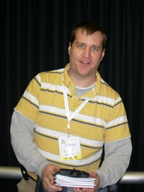“Where did the Bible come from?” “What is hell like?” “Who is God?” These are just some of the questions posed by young people that are included in new curriculum published by the Presbyterian Church (U.S.A.) as part of the renewed We Believe series.
The new youth curriculum, FAQ for younger youth, and Faith Questions for older youth, was introduced at a workshop at the Association of Presbyterian Church Educators (APCE) event here Jan. 27-30.
The developers of the curriculum, Beth Herrinton-Hodge and Michael Harper, asked youth from around the country for their questions about faith. The curriculum was built around these questions. Apparently, the questions poured in.
“Teens by nature are curious,” Harper said. “They have all these wonderful questions and we wanted to respond faithfully to them.”
Both Harper and Herrinton-Hodge see this as an opportunity to meet the youth of the church and respond to them where they are.
“All the writers of the materials are actively involved in youth ministries in congregations. They know the culture, the language, the real lives of the youth of our church. The writers are relevant so the curriculum is relevant to what is happening now,” explained Herrinton-Hodge.
The curriculum itself is intended to help foster what the developers call a “culture of curiosity.” As Harper says, “the whole point is to not block curiosity but to let those questions flow.”
The two offered some suggestions for fostering this culture of curiosity: foster intimacy amongst the youth so they feel comfortable exploring together; adult leaders model exploring questions without fear about having the “right” answer; look to stories from scripture to aid in discussing the possible answers posed by the questions.
As for the teacher’s role, Herrinton-Hodge and Harper said, it is always as “mentor and guide. The teaching role is not an all-knowing authority imparting answers to young people’s questions. Rather, the teacher aids the youth in exploring for themselves.”
In approaching these youth-driven questions of faith, the Bible and other resources from our tradition, such as the Book of Confessions, are utilized in the curriculum. This allows young people to explore questions of faith with the resources of their faith and denomination at hand.
A unique quality to the curriculum, the developers said, is that it appeals to different styles of learning, utilizing research on multiple intelligences. It might incorporate music or video clips to connect to the session but these elements don’t have to be used.
One of the writers, Hansen Wendlandt, who is associate pastor for youth, young adults and mission at Providence Presbyterian Church in Charlotte, N.C. explained how video might be used with the curriculum. He worked on the volume about interfaith relations and said that “one activity is to look at a YouTube video created by a nonbeliever and to create a response video that both respects the perspective of the nonbeliever and expresses the young person’s faith.” It may or may not then be posted on YouTube.
The developers also sought to make it simple for adult leaders, with all resources and resource sheets available online.
Harper and Herrinton-Hodge are also available: Both said they want anyone with questions or issues to email them. “I specifically check my email on Saturdays so that anyone preparing their lesson for the next day can reach me if they have any questions,” said Harper.
What comes through clearly is that this curriculum was developed with the people who use it in mind. “We’ve been working really hard to listen and respond to the needs of those the curriculum serves,” Harper explained.
Herrinton-Hodge is most excited about the fact that the curriculum is so relevant to where young people are developmentally. “I so wanted to provide something to the church that is viable, available to teachers and relevant to the young people where they can learn about and articulate their faith. With this curriculum we are providing a place for them to explore and make it their own,” she said.
And Harper really wants it to be engaging. “It really kills me to go into churches and see the youth bored in Sunday school. We are providing something that can engage the youth in meaningful conversations and engage them in the church.”
The Rev. Janet Tuck is director of communications for the Synod of Living Waters and a frequent contributor to Presbyterian News Service.

